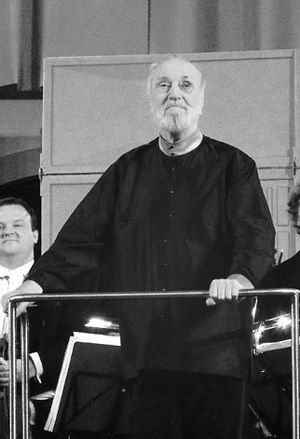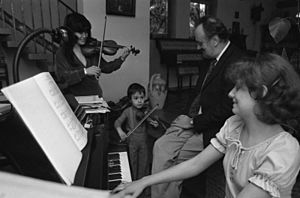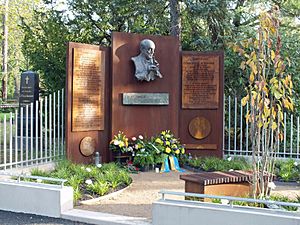Kurt Masur facts for kids
Quick facts for kids
Kurt Masur
|
|
|---|---|

Masur conducting the Dresdner Philharmonie (Dresden) in 2012
|
|
| Born | 18 July 1927 Brieg, Lower Silesia, Germany
|
| Died | 19 December 2015 (aged 88) Greenwich, Connecticut, U.S.
|
| Burial place | Südfriedhof (Leipzig), Germany |
| Alma mater | University of Music and Theatre Leipzig |
| Occupation | Conductor |
| Years active | 1955–2014 |
| Organization |
|
| Style | Classical music |
| Spouse(s) | Brigitte Stütze (div. 1966) Irmgard Elsa Kaul (to 1972, her death) Tomoko Sakurai (m. 1975) |
| Children | 5 |
Kurt Masur (born July 18, 1927 – died December 19, 2015) was a famous German conductor. A conductor leads an orchestra or choir, guiding the musicians through a piece of music. He was known as one of the last "old-style maestros," which means he was a very respected and traditional leader in classical music.
Masur led many important orchestras during his long career. He was the main conductor, called a Kapellmeister, of the Leipzig Gewandhaus Orchestra for many years. He also served as the music director for the New York Philharmonic in the United States. He made many recordings of classical music with major orchestras. Masur is also remembered for his brave actions during peaceful protests in Leipzig in 1989. These protests helped lead to the fall of the Berlin Wall.
Contents
Early Life and Education
Kurt Masur was born in Brieg, a town in what was then Lower Silesia, Germany. Today, this town is called Brzeg and is part of Poland. When he was young, he studied piano, composition (how to write music), and conducting in Leipzig, Germany.
His father was an electrical engineer. Kurt even completed an apprenticeship as an electrician and sometimes helped in his father's shop. From age 10 to 16, he took piano lessons.
In 1944, during World War II, Masur was drafted into the army as a paratrooper. He was sent to fight and was one of the few survivors from his unit. He was captured by American and British forces in May 1945. Luckily, no one in his family died during the war.
After the war, from 1946 to 1948, he studied music at the University of Music and Theatre Leipzig. He left at age 21 to start his career, even though he hadn't finished his studies. His first job was as a répétiteur (a coach for singers and musicians) at the Halle Opera House.
Family Life
Kurt Masur was married three times and had five children. His first marriage ended in 1966. With his second wife, Irmgard Elsa Kaul, he had a daughter named Carolin, who became an opera singer. Sadly, Irmgard died in a car accident in 1972, and Masur was also badly hurt. In 1975, he married his third wife, Tomoko Sakurai, who was a singer and played the viola. They had a son named Ken-David, who also became a classical singer and conductor.
Leading Orchestras
Early Conducting Roles
Masur conducted the Dresden Philharmonic from 1955 to 1958 and again from 1967 to 1972. He also worked with the Komische Oper in East Berlin. In 1970, he became the Kapellmeister (main conductor) of the Leipzig Gewandhaus Orchestra. He held this important position until 1996. With this orchestra, he performed Beethoven's Ninth Symphony in 1990 to celebrate German reunification, when East and West Germany became one country again.
New York Philharmonic
In 1991, Masur became the music director of the New York Philharmonic (NYP). This was a surprising choice, but he brought important changes to the orchestra. Many people felt he helped the orchestra improve greatly. One musician said that Masur's strong personality and intensity inspired everyone to play better.
After the terrorist attacks on September 11, 2001, Masur led the Philharmonic in a special performance of Brahms's Ein deutsches Requiem. This was a very moving performance for the city. Masur left the NYP in 2002. He was given a new title, Music Director Emeritus, which means he was still honored as a past leader.
International Engagements
From 2000 to 2007, Masur was the principal conductor of the London Philharmonic Orchestra (LPO). In 2002, he also became the music director of the Orchestre National de France (ONF), a role he held until 2008. He then became the honorary music director of the ONF.
On his 80th birthday in 2007, Masur conducted musicians from both the London Philharmonic and the Orchestre National de France at a Proms concert in London. He also held the special title of Honorary Guest Conductor of the Israel Philharmonic Orchestra for life. In 2012, Masur announced that he had Parkinson's disease, which is a condition that affects movement.
Political Involvement
Kurt Masur spent most of his career in East Germany, which was a communist country. However, he never joined the ruling political party there. In 1982, he received a national award from East Germany.
His views on the government began to change in 1989. On October 9, 1989, he played a key role in the anti-government demonstrations in Leipzig. These were peaceful protests where people marched to demand more freedom. Masur helped to calm a tense situation between the protesters and security forces. His actions helped prevent violence and were an important part of the events that led to the fall of the Berlin Wall just one month later.
Later Life and Death
In 2015, Kurt Masur passed away at the age of 88 in Greenwich, Connecticut, in the U.S. He died from problems related to Parkinson's disease. His funeral was held in the Thomaskirche church in Leipzig, with music played by the Leipzig Gewandhaus Orchestra. He was buried in the South Leipzig Cemetery, called Südfriedhof. He was survived by his third wife, his five children, and nine grandchildren.
Awards and Recognition
Kurt Masur became a professor at the Leipzig Academy of Music in 1975. He received many awards and honors throughout his life.
In 1995, he received the Cross of the Order of Merit of the Federal Republic of Germany, which is a high honor in Germany. He also received the Gold Medal of Honor for Music in 1996. In 1997, he was made a Commander of the Legion of Honour by the French government, and New York City named him its Cultural Ambassador. In 1999, he received a high award from Poland.
In 2002, the President of Germany gave him an even higher level of the Order of Merit. In 2007, he received the Grand Cross of the Order of Merit, which is one of Germany's highest honors. In 2008, he received the Wilhelm Furtwängler Prize. Masur was also named an Honorary Citizen of his hometown, Brieg. In 2001, he became an Honorary Member of the Royal Academy of Music.
In 2010, he received the Leo Baeck Medal for his work promoting kindness and fairness. He also received an award in 2014 for his work in public policy. On July 18, 2018, which would have been his 91st birthday, Google honored him with a special Google Doodle in several countries.]]
See also
 In Spanish: Kurt Masur para niños
In Spanish: Kurt Masur para niños
 | Claudette Colvin |
 | Myrlie Evers-Williams |
 | Alberta Odell Jones |



